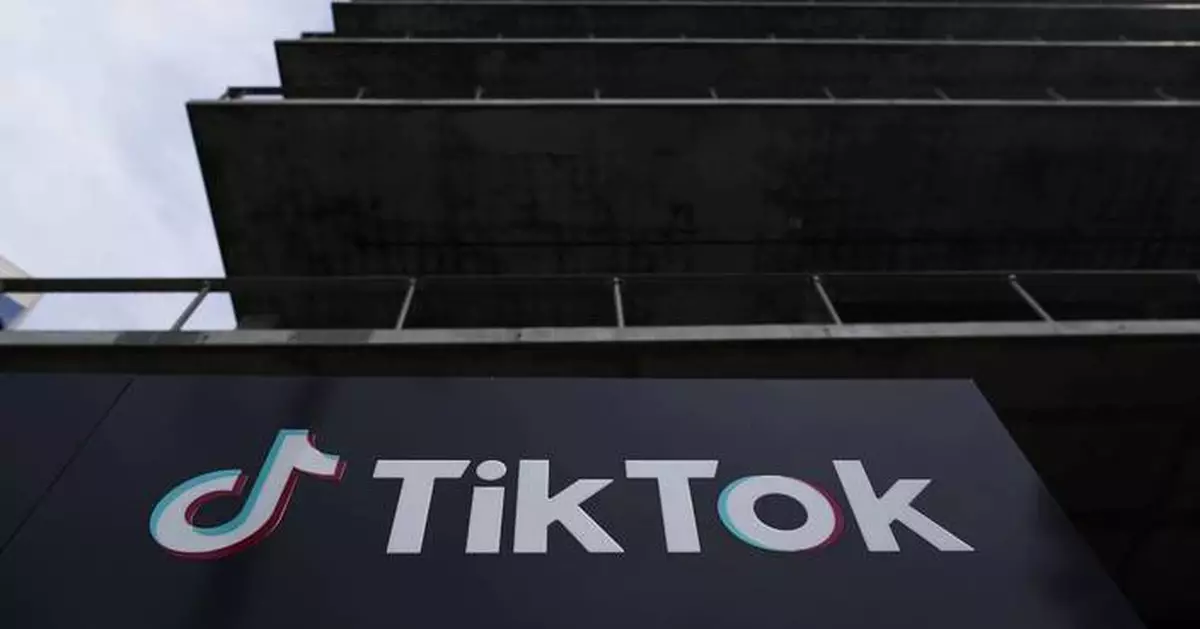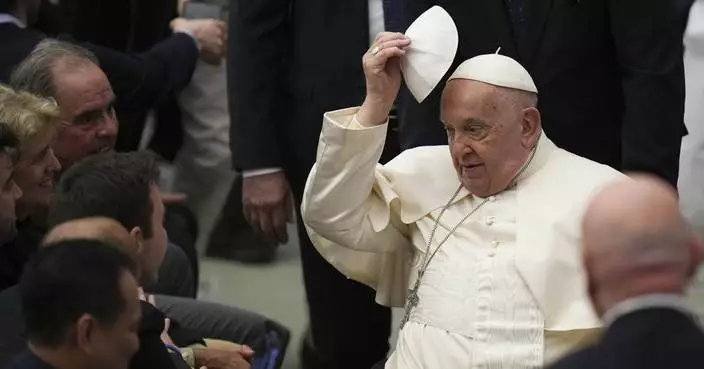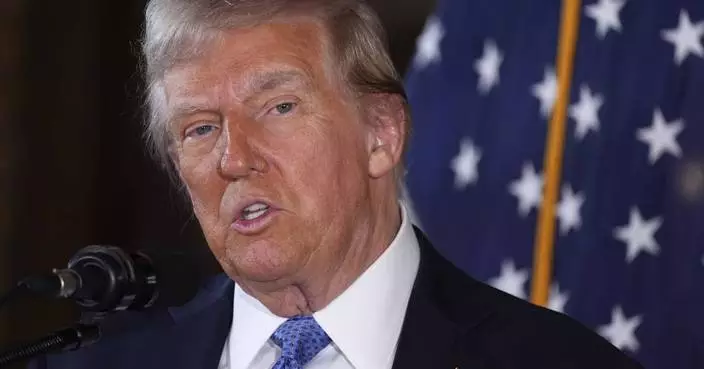TikTok faced off with the U.S. government in federal court on Monday, arguing a law that could ban the platform in a few short months is unconstitutional while the Justice Department said it is needed to eliminate a national security risk posed by the popular social media company.
In a more than two-hour appearance before a panel of three judges at a federal appeals court in Washington, attorneys for the two sides - and content creators - were pressed on their best arguments for and against the law that forces TikTok and its China-based parent company ByteDance to break ties by mid-January or lose one of their biggest markets in the world.
Click to Gallery
TikTok content creators Talia Cadet, left, and Paul Tran leave the federal courthouse in Washington, Monday, Sept. 16, 2024, after a hearing on TikTok's lawsuit against the federal government. (AP Photo/Jose Luis Magana)
TikTok content creator Paul Tran talk to the press as he leaves the federal courthouse in Washington, Monday, Sept. 16, 2024, after a hearing on TikTok's lawsuit against the federal government. (AP Photo/Jose Luis Magana)
TikTok Attorney Andrew Pincus leaves the federal courthouse in Washington, Monday, Sept. 16, 2024, after a hearing on TikTok's lawsuit against the federal government. (AP Photo/Jose Luis Magana)
FILE - The TikTok Inc. building is seen in Culver City, Calif., on March 17, 2023. (AP Photo/Damian Dovarganes, File)
TikTok content creator Paul Tran talks to the press as he leaves the federal courthouse in Washington, Monday, Sept. 16, 2024, after a hearing on TikTok's lawsuit against the federal government. (AP Photo/Jose Luis Magana)
FILE - The TikTok Inc. building is seen in Culver City, Calif., on March 17, 2023. (AP Photo/Damian Dovarganes, File)
Andrew Pincus, a veteran attorney representing the two companies, argued in court that the law unfairly targets the company and runs afoul of the First Amendment because TikTok Inc. - the U.S. arm of TikTok - is an American entity. After his remarks, another attorney representing content creators who are also challenging the law argued it violates the rights of U.S. speakers and is akin to prohibiting Americans from publishing on foreign-owned media outlets, such as Politico, Al Jazeera or Spotify.
“The law before this court is unprecedented and its effect would be staggering,” Pincus said, adding the act would impose speech limitations based on future risks.
The measure, signed by President Joe Biden in April, was the culmination of a years-long saga in Washington over the short-form video-sharing app, which the government sees as a national security threat due to its connections to China.
The U.S. has said it's concerned about TikTok collecting vast swaths of user data, including sensitive information on viewing habits, that could fall into the hands of the Chinese government through coercion. Officials have also warned the proprietary algorithm that fuels what users see on the app is vulnerable to manipulation by Chinese authorities, who can use it to shape content on the platform in a way that’s difficult to detect.
Daniel Tenny, an attorney for the Justice Department, acknowledged in court that data collection is useful for many companies for commercial purposes, such as target advertisements or tailoring videos to users' interests.
“The problem is that same data is extremely valuable to a foreign adversary trying to compromise the security of the United States,” he said.
Pincus, the attorney for TikTok, said Congress should have erred on the side of disclosing any potential propaganda on the platform instead of pursuing a divesture-or-ban approach, which the two companies have maintained will only lead to a ban. He also said statements from lawmakers before the law was passed shows they were motivated by the propaganda they perceived to be on TikTok, namely an imbalance between pro-Palestinian and pro-Israel content on the platform during the war in Gaza.
But the panel - composed of two Republican and one Democrat appointed judges - expressed some skepticism, pressing the attorneys on TikTok's side if they believe the government has any leeway to curtail an influential media company controlled by a foreign entity in an adversarial nation. In parts of their questions about TikTok's foreign ownership, the judges asked if the arguments presented would apply in cases where the U.S. is engaged in war.
Judge Neomi Rao, who was appointed by former President Donald Trump, said the creators suing over the law could continue speaking on TikTok if the company is sold or if they choose to post content on other platforms. But Jeffrey Fisher, their attorney, argued there are not “interchangeable mediums” for them because TikTok — which has 170 million U.S. users — is unique in its look and feel, and the types of audiences it allows them to reach.
Paul Tran, one of the content creators who is suing the government, told reporters outside the courthouse on Monday that a skincare company him and his wife founded in 2018 was struggling until they started making TikTok videos three years ago. He said they had tried to market their products through traditional advertising and other social media apps. But the TikTok videos were the only thing that drove views, helping them get enough orders to sell out of products and even appear on TV shows.
“TikTok truly invigorated our company and saved it from collapse,” Tran said.
Currently, he noted the company - Love and Pebble - sells more than 90% of its products over TikTok, which is covering the legal fees for the creator lawsuit.
In the second half of the hearing, the panel pressed the Justice Department on First Amendment challenges to the law.
Judge Sri Srinivasan, the chief judge on the court who was appointed by former President Barack Obama, said efforts to stem content manipulation through government action does set off alarm bells and impact people who receive speech on TikTok. Tenny, the attorney for the DOJ, responded by saying the law doesn't target TikTok users or creators and that any impact on them is only indirect.
For its part, TikTok has repeatedly said it does not share U.S. user data with the Chinese government and that concerns the government has raised have never been substantiated. In their lawsuit, TikTok and ByteDance have also claimed divestment is not possible. And even if it was, they say TikTok would be reduced to a shell of its former self because it would be stripped of the technology that powers it.
Though the government’s primary reasoning for the law is public, significant portions of its court filings includes information that's redacted.
In one of the redacted statements submitted in late July, the Justice Department claimed TikTok took direction from the Chinese government about content on its platform, without disclosing additional details about when or why those incidents occurred. Casey Blackburn, a senior U.S. intelligence official, wrote in a legal statement that ByteDance and TikTok “have taken action in response” to Chinese government demands “to censor content outside of China.” Though the intelligence community had “no information” that this has happened on the platform operated by TikTok in the U.S., Blackburn said it may occur.
But the companies have argued the government could have taken a more tailored approach to resolve its concerns.
During high-stakes negotiations with the Biden administration more than two years ago, TikTok presented the government with a draft 90-page agreement that allows a third party to monitor the platform’s algorithm, content moderation practices and other programming. But it said a deal was not reached because government officials essentially walked away from the negotiating table in August 2022.
Justice officials have argued complying with the draft agreement is impossible, or would require extensive resources, due to the size and the technical complexity of the platform. They say the only thing that would resolve the government’s concerns is severing the ties between TikTok and ByteDance.
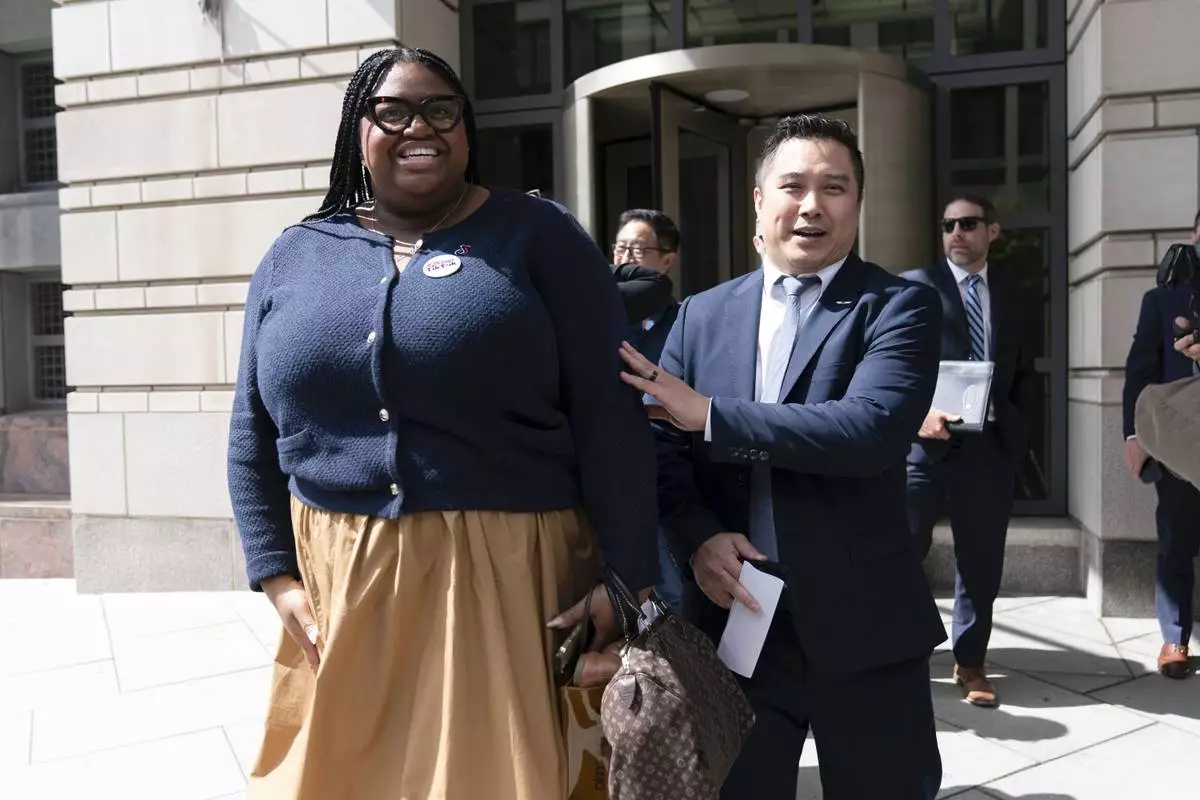
TikTok content creators Talia Cadet, left, and Paul Tran leave the federal courthouse in Washington, Monday, Sept. 16, 2024, after a hearing on TikTok's lawsuit against the federal government. (AP Photo/Jose Luis Magana)
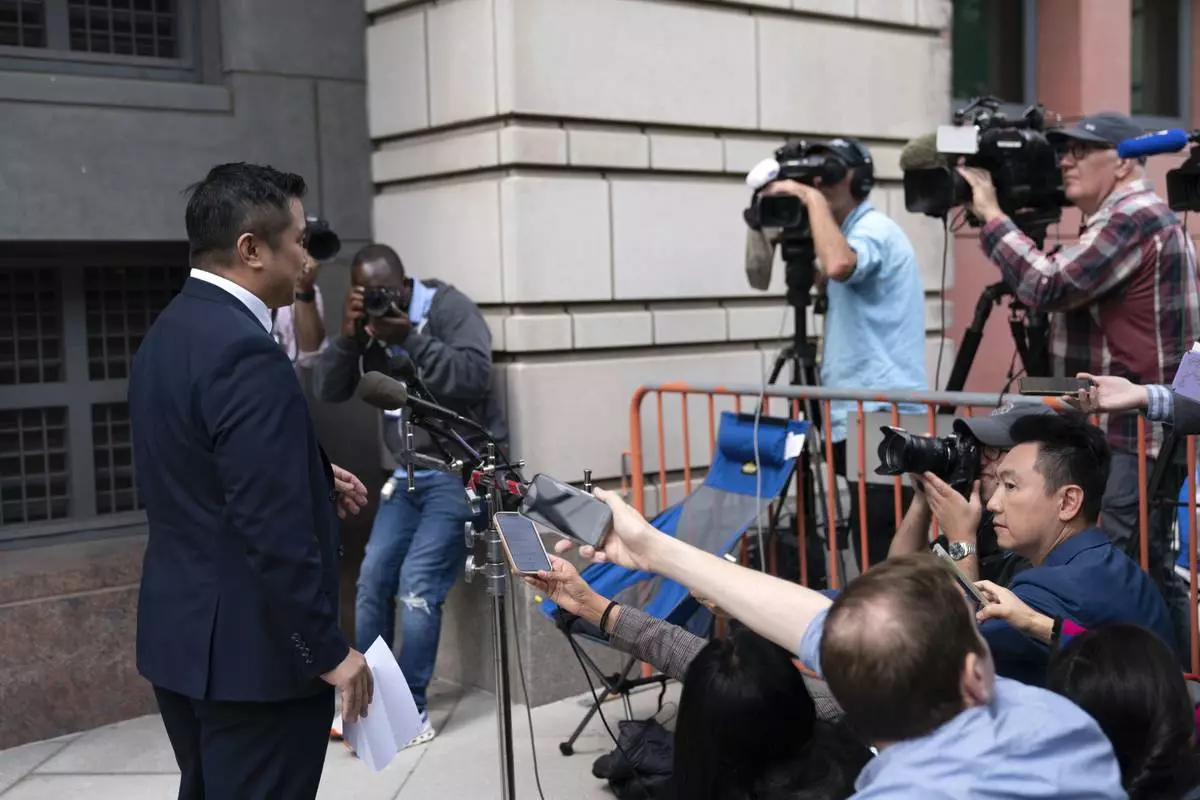
TikTok content creator Paul Tran talk to the press as he leaves the federal courthouse in Washington, Monday, Sept. 16, 2024, after a hearing on TikTok's lawsuit against the federal government. (AP Photo/Jose Luis Magana)
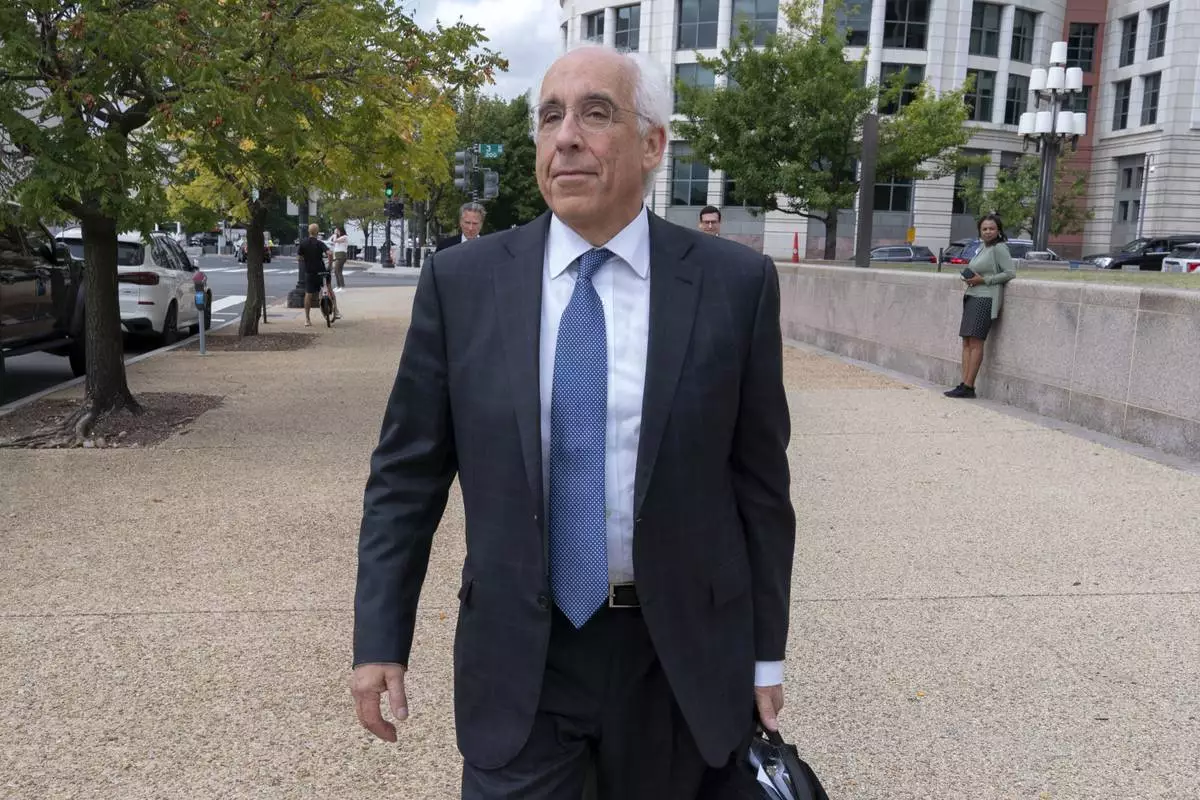
TikTok Attorney Andrew Pincus leaves the federal courthouse in Washington, Monday, Sept. 16, 2024, after a hearing on TikTok's lawsuit against the federal government. (AP Photo/Jose Luis Magana)
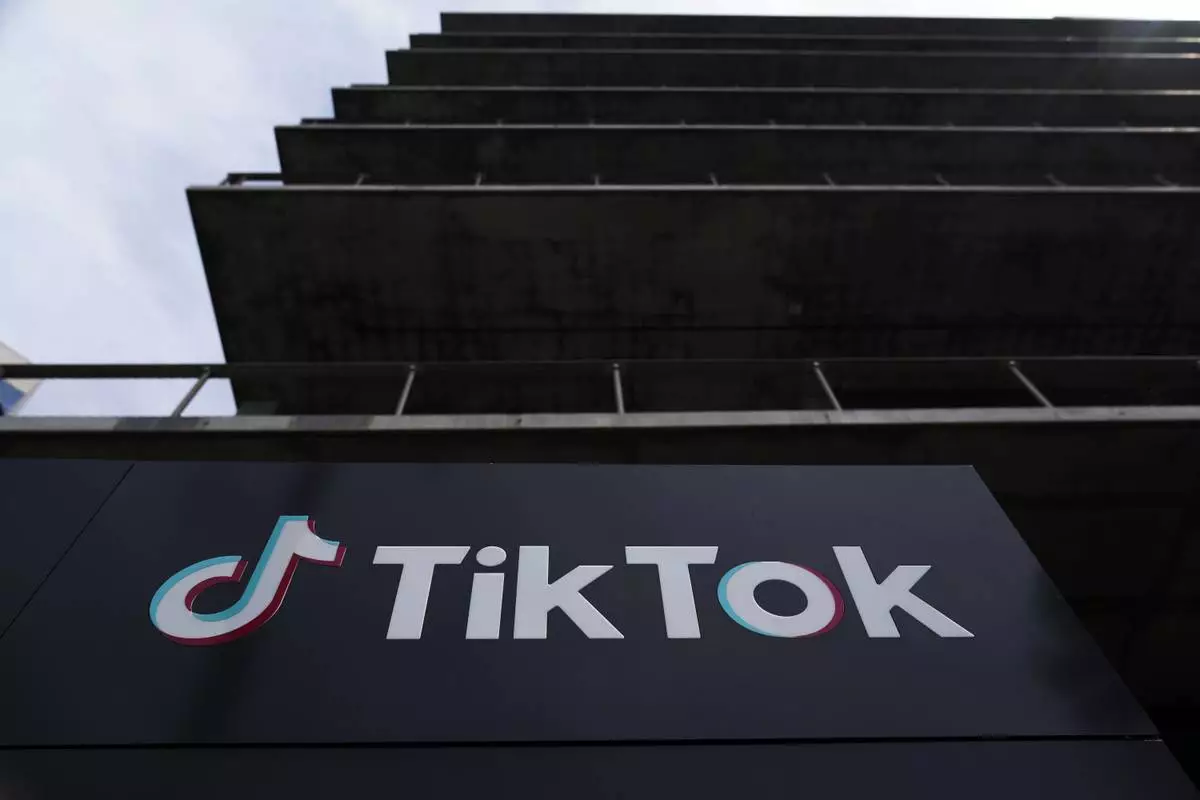
FILE - The TikTok Inc. building is seen in Culver City, Calif., on March 17, 2023. (AP Photo/Damian Dovarganes, File)
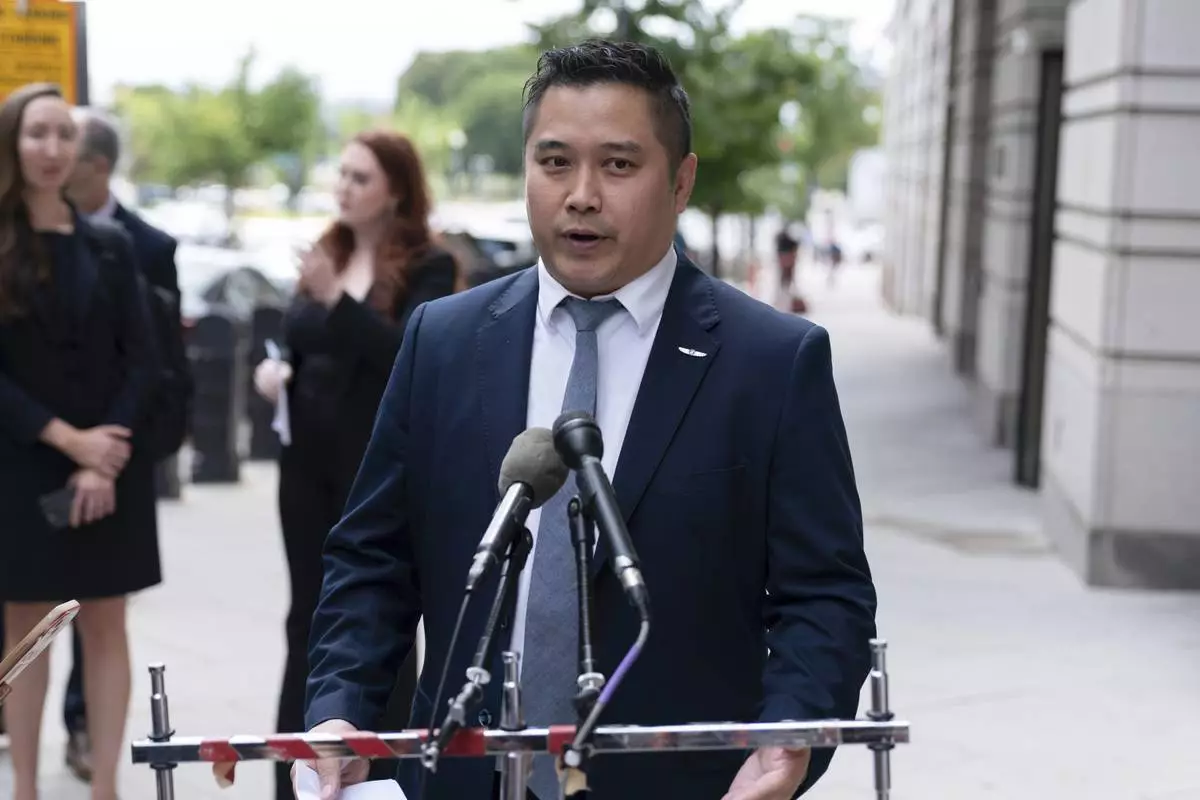
TikTok content creator Paul Tran talks to the press as he leaves the federal courthouse in Washington, Monday, Sept. 16, 2024, after a hearing on TikTok's lawsuit against the federal government. (AP Photo/Jose Luis Magana)
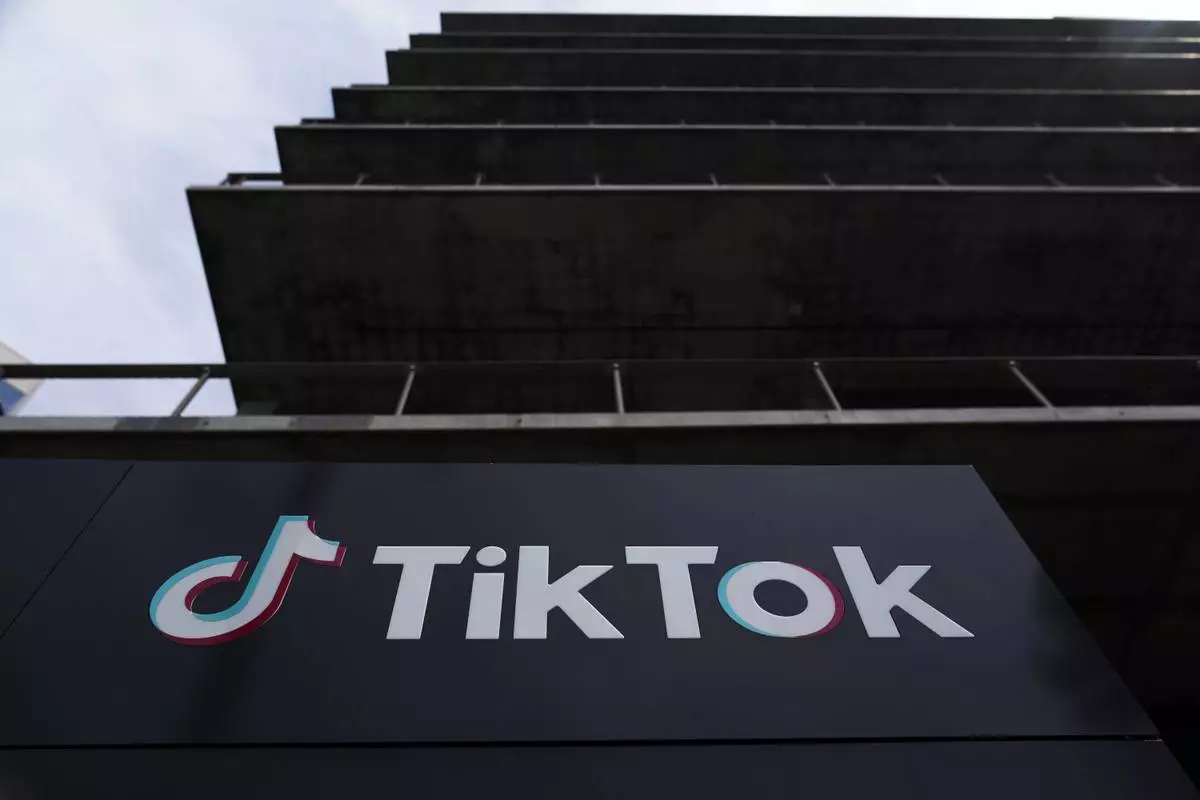
FILE - The TikTok Inc. building is seen in Culver City, Calif., on March 17, 2023. (AP Photo/Damian Dovarganes, File)
MAGDEBURG, Germany (AP) — Germans on Saturday mourned both the victims and their shaken sense of security after a Saudi doctor intentionally drove into a Christmas market teeming with holiday shoppers, killing at least five people, including a small child, and wounding at least 200 others.
Authorities arrested a 50-year-old man at the site of the attack in Magdeburg on Friday evening and took him into custody for questioning. He has lived in Germany since 2006, practicing medicine in Bernburg, about 40 kilometers (25 miles) south of Magdeburg. officials said.
The state governor, Reiner Haseloff, told reporters that the death toll rose to five from a previous figure of two and that more than 200 people in total were injured.
Chancellor Olaf Scholz said that nearly 40 of them "are so seriously injured that we must be very worried about them.”
Several German media outlets identified the suspect as Taleb A., withholding his last name in line with privacy laws, and reported that he was a specialist in psychiatry and psychotherapy.
Mourners lit candles and placed flowers outside a church near the market on the cold and gloomy day. Several people stopped and cried. A Berlin church choir whose members witnessed a previous Christmas market attack in 2016 sang Amazing Grace, a hymn about God's mercy, offering their prayers and solidarity with the victims.
There were still no answers Saturday as to what motivated the man to drive his black BMW into a crowd in the eastern German city.
Describing himself as a former Muslim, the suspect shared dozens of tweets and retweets daily focusing on anti-Islam themes, criticizing the religion and congratulating Muslims who left the faith.
He also accused German authorities of failing to do enough to combat what he said was the “Islamism of Europe.” Some described him as an activist who helped Saudi women flee their homeland. He has also voiced support for the far-right and anti-immigrant Alternative for Germany (AfD) party.
Haseloff said Friday that authorities believed the man acted alone.
The violence shocked Germany and the city, bringing its mayor to the verge of tears and marring a festive event that’s part of a centuries-old German tradition. It prompted several other German towns to cancel their weekend Christmas markets as a precaution and out of solidarity with Magdeburg’s loss. Berlin kept its markets open but has increased its police presence at them.
Germany has suffered a string of extremist attacks in recent years, including a knife attack that killed three people and wounded eight at a festival in the western city of Solingen in August.
Magdeburg is a city of about 240,000 people, west of Berlin, that serves as Saxony-Anhalt’s capital. Friday’s attack came eight years after an Islamic extremist drove a truck into a crowded Christmas market in Berlin, killing 13 people and injuring many others. The attacker was killed days later in a shootout in Italy.
Chancellor Scholz and Interior Minister Nancy Faeser traveled to Magdeburg on Saturday, and a memorial service is to take place in the city cathedral in the evening. Faeser ordered flags lowered to half-staff at federal buildings across the country.
Verified bystander footage distributed by the German news agency dpa showed the suspect’s arrest at a tram stop in the middle of the road. A nearby police officer pointing a handgun at the man shouted at him as he lay prone, his head arched up slightly. Other officers swarmed around the suspect and took him into custody.
Thi Linh Chi Nguyen, a 34-year-old manicurist from Vietnam whose salon is located in a mall across from the Christmas market, was on the phone during a break when she heard loud bangs and thought at first they were fireworks. She then saw a car drive through the market at high speed. People screamed and a child was thrown into the air by the car.
Shaking as she described the horror of what she witnessed, she recalled seeing the car bursting out of the market and turning right onto Ernst-Reuter-Allee street and then coming to a standstill at the tram stop where the suspect was arrested.
The number of injured people was overwhelming.
“My husband and I helped them for two hours. He ran back home and grabbed as many blankets as he could find because they didn’t have enough to cover the injured people. And it was so cold," she said.
The market itself was still cordoned off Saturday with red-and-white tape and police vans every 50 meters (yards). Police with machine pistols guarded every entry to the market. Some thermal security blankets still lay on the street.
Christmas markets are a German holiday tradition cherished since the Middle Ages, now successfully exported to much of the Western world.
Aboubakr reported from Cairo and Gera from Warsaw, Poland. Geir Moulson contributed from Berlin.

A blanket lies on a Christmas Market, where a car drove into a crowd on Friday evening, in Magdeburg, Germany, Saturday, Dec. 21, 2024. (AP Photo/Michael Probst)

Policemen guard a Christmas Market, where a car drove into a crowd on Friday evening, in Magdeburg, Germany, Saturday, Dec. 21, 2024. (AP Photo/Michael Probst)

Policemen guard a Christmas Market, where a car drove into a crowd on Friday evening, in Magdeburg, Germany, Saturday, Dec. 21, 2024. (AP Photo/Michael Probst)

German Chancellor Olaf Scholz, centre, speaks at a Christmas Market, where a car drove into a crowd on Friday evening, in Magdeburg, Germany, Saturday, Dec. 21, 2024. (AP Photo/Michael Probst)

Citizens pay tribute to deaths outside St. John's Church near a Christmas Market, where a car drove into a crowd on Friday evening, in Magdeburg, Germany, Saturday, Dec. 21, 2024. (AP Photo/Ebrahim Noorozi)

Citizens pay tribute and cry for deaths outside St. John's Church near a Christmas Market, where a car drove into a crowd on Friday evening, in Magdeburg, Germany, Saturday, Dec. 21, 2024. (AP Photo/Ebrahim Noorozi)

A policeman, right, stands on a Christmas Market, where a car drove into a crowd on Friday evening, in Magdeburg, Germany, Saturday, Dec. 21, 2024. (AP Photo/Michael Probst)

Citizens pay tribute to deaths outside St. John's Church near a Christmas Market, where a car drove into a crowd on Friday evening, in Magdeburg, Germany, Saturday, Dec. 21, 2024. (AP Photo/Ebrahim Noorozi)

Two firefighters walk through a cordoned-off area near a Christmas Market, after a car drove into a crowd in Magdeburg, Germany, Saturday, Dec. 21, 2024. (AP Photo/Ebrahim Noroozi)

A damaged car sits with its doors open after a driver plowed into a busy Christmas market in Magdeburg, Germany, early Saturday, Dec. 21, 2024. (Hendrik Schmidt/dpa via AP)

Police stand at a Christmas market in Magdeburg, Germany, early Saturday, Dec. 21, 2024, after a driver plowed into a group of people at the market late Friday. (Hendrik Schmidt/dpa via AP)

Police stand at a Christmas market in Magdeburg, Germany, early Saturday, Dec. 21, 2024, after a driver plowed into a group of people at the market late Friday. (Hendrik Schmidt/dpa via AP)

A damaged car sits with its doors open after a driver plowed into a busy Christmas market in Magdeburg, Germany, early Saturday, Dec. 21, 2024. (Hendrik Schmidt/dpa via AP)

Police officers and police emergency vehicles are seen at the Christmas market in Magdeburg after a driver plowed into a busy Christmas market in Magdeburg, Germany, Saturday, Dec. 21, 2024. (Matthias Bein/dpa via AP)

Security guards stand in front of a cordoned-off Christmas Market after a car crashed into a crowd of people, in Magdeburg, Germany, Saturday early morning, Dec. 21, 2024. (AP Photo/Ebrahim Noroozi)

A barrier tape and police vehicles are seen in front of the entrance to the Christmas market in Magdeburg after a driver plowed into a busy Christmas market in Magdeburg, Germany, Saturday, Dec. 21, 2024. (Sebastian Kahnert/dpa via AP)

The car that was crashed into a crowd of people at the Magdeburg Christmas market is seen following the attack in Magdeburg, Germany, Saturday early morning, Dec. 21, 2024. (AP Photo/Ebrahim Noroozi)
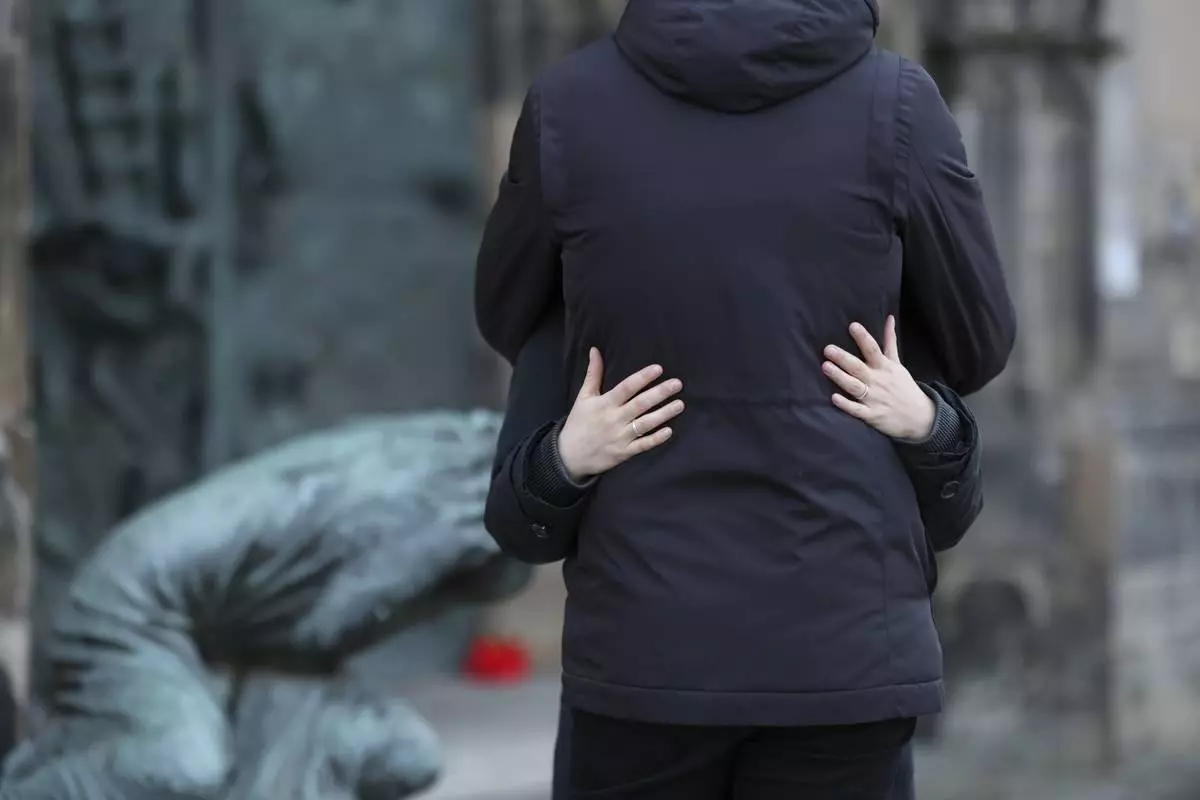
People mourn in front of St. John's Church for the victims of Friday's attack at the Christmas market in Magdeburg, Germany, Saturday, Dec. 21, 2024. (Matthias Bein/dpa via AP)

Police tape cordons-off a Christmas Market, where a car drove into a crowd on Friday evening, in Magdeburg, Germany, Saturday, Dec. 21, 2024. (AP Photo/Ebrahim Noroozi)

A police officer stands guard at at a cordoned-off area near a Christmas Market, where a car drove into a crowd on Friday evening, in Magdeburg, Germany, Saturday, Dec. 21, 2024. (AP Photo/Ebrahim Noroozi)

Police officers patrol a cordoned-off area at a Christmas Market, where a car drove into a crowd on Friday evening, in Magdeburg, Germany, Saturday, Dec. 21, 2024. (AP Photo/Ebrahim Noroozi)

Security guards stand in front of a cordoned-off Christmas Market after a car crashed into a crowd of people, in Magdeburg, Germany, Saturday, Dec. 21, 2024. (AP Photo/Ebrahim Noroozi)

Emergency services work in a cordoned-off area near a Christmas Market, after a car drove into a crowd in Magdeburg, Germany, Saturday, Dec. 21, 2024. (AP Photo/Ebrahim Noroozi)

Emergency services work in a cordoned-off area near a Christmas Market, after a car drove into a crowd in Magdeburg, Germany, Friday, Dec. 20, 2024. (AP Photo/Ebrahim Noroozi)

Emergency services work in a cordoned-off area near a Christmas Market, after a car drove into a crowd in Magdeburg, Germany, Friday, Dec. 20, 2024. (AP Photo/Ebrahim Noroozi)

Reiner Haseloff, Minister President of Saxony-Anhalt, center, is flanked by Tamara Zieschang, Minister of the Interior and Sport of Saxony-Anhalt, left, and Simone Borris, Mayor of the City of Magdeburg, at a press conference after a car plowed into a busy outdoor Christmas market in Magdeburg, Germany Friday, Dec. 20, 2024. (Hendrik Schmidt/dpa via AP)

Emergency services work in a cordoned-off area near a Christmas Market, after a car drove into a crowd in Magdeburg, Germany, Friday, Dec. 20, 2024. (AP Photo/Ebrahim Noroozi)

Emergency services work in a cordoned-off area near a Christmas Market, after a car drove into a crowd in Magdeburg, Germany, Friday, Dec. 20, 2024. (AP Photo/Ebrahim Noroozi)

Emergency services work in a cordoned-off area near a Christmas Market, after a car drove into a crowd in Magdeburg, Germany, Friday, Dec. 20, 2024. (AP Photo/Ebrahim Noroozi)

A police officer guards at a blocked road near a Christmas Market, after an incident in Magdeburg, Germany, Friday, Dec. 20, 2024. (AP Photo/Ebrahim Noroozi)

Emergency services attend an incident at the Christmas market in Magdeburg, Germany, Friday Dec. 20, 2024. (Dörthe Hein/dpa via AP)

Emergency services attend an incident at the Christmas market in Magdeburg, Germany, Friday Dec. 20, 2024. (Heiko Rebsch/dpa via AP)

Emergency services attend an incident at the Christmas market in Magdeburg, Germany, Friday Dec. 20, 2024. (Heiko Rebsch/dpa via AP)

A police officer guards at a cordoned-off area near a Christmas Market after an incident in Magdeburg, Germany, Friday, Dec. 20, 2024. (AP Photo/Ebrahim Noroozi)

In this screen grab image from video, special police forces attend an incident at the Christmas market in Magdeburg, Germany, Friday Dec. 20, 2024. (Thomas Schulz/dpa via AP)

Reiner Haseloff (M, CDU), Minister President of Saxony-Anhalt, makes a statement after an incident at the Christmas market in Magdeburg, Germany, Friday Dec. 20, 2024. (Heiko Rebsch/dpa via AP)

A police officer speaks with a man at a cordoned-off area near a Christmas Market after an incident in Magdeburg, Germany, Friday, Dec. 20, 2024. (AP Photo/Ebrahim Noroozi)
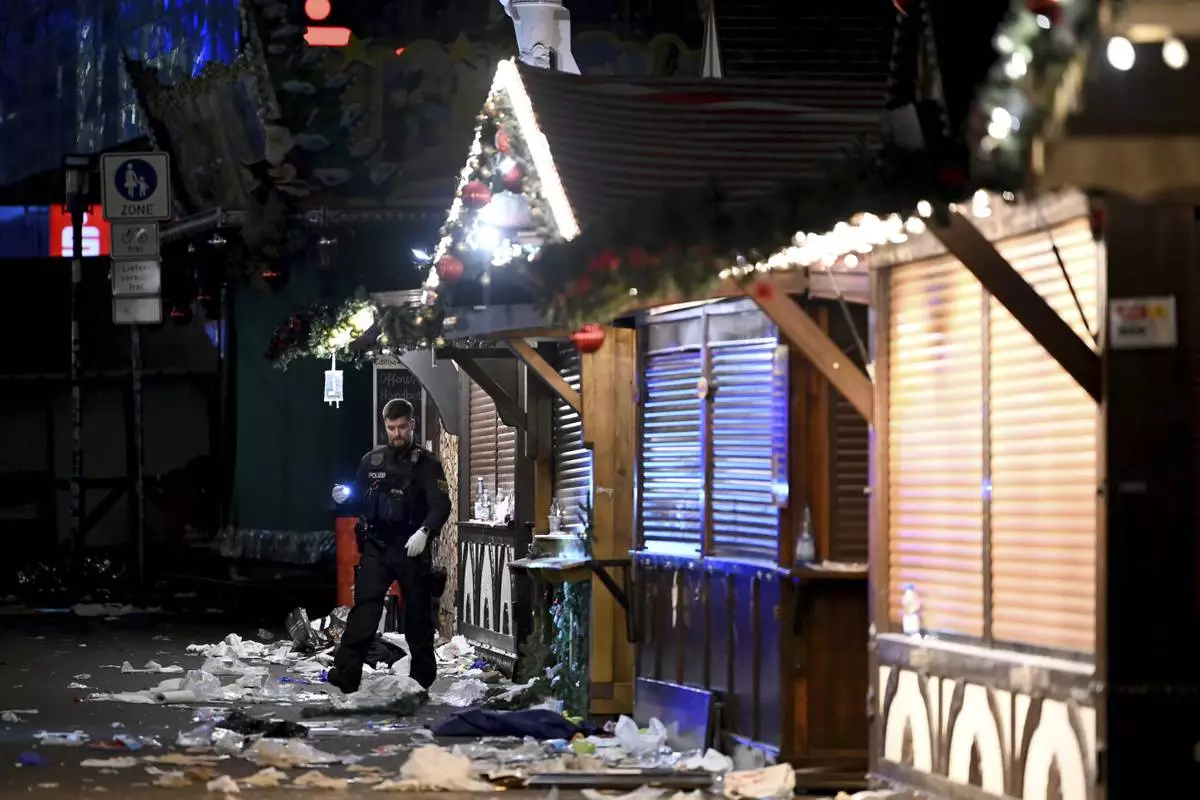
A policeman is seen at the Christmas market where an incident happened in Magdeburg, Germany, Friday Dec. 20, 2024. (Heiko Rebsch/dpa via AP)

A firefighter walks through a cordoned-off area near a Christmas Market, after a car drove into a crowd in Magdeburg, Germany, Saturday, Dec. 21, 2024. (AP Photo/Ebrahim Noroozi)

Emergency services work in a cordoned-off area near a Christmas Market, after an incident in Magdeburg, Germany, Friday, Dec. 20, 2024. (AP Photo/Ebrahim Noroozi)

A view of the cordoned-off Christmas market after an incident in Magdeburg, Germany, Friday Dec. 20, 2024. (Heiko Rebsch/dpa via AP)

A police officer guards at a blocked road near a Christmas market after an incident in Magdeburg, Germany, Friday, Dec. 20, 2024. (AP Photo/Ebrahim Noroozi)

The car that was crashed into a crowd of people at the Magdeburg Christmas market is seen following the attack in Magdeburg, Germany, Saturday early morning, Dec. 21, 2024. (AP Photo/Ebrahim Noroozi)

Security guards stand in front of a cordoned-off Christmas Market after a car crashed into a crowd of people, in Magdeburg, Germany, Saturday early morning, Dec. 21, 2024. (AP Photo/Ebrahim Noroozi)

Security guards stand in front of a cordoned-off Christmas Market after a car crashed into a crowd of people, in Magdeburg, Germany, Saturday early morning, Dec. 21, 2024. (AP Photo/Ebrahim Noroozi)

The car that was crashed into a crowd of people at the Magdeburg Christmas market is seen following the attack in Magdeburg, Germany, Saturday early morning, Dec. 21, 2024. (AP Photo/Ebrahim Noroozi)

Forensics work on a damaged car sitting with its doors open after a driver plowed into a busy Christmas market in Magdeburg, Germany, early Saturday, Dec. 21, 2024. (Hendrik Schmidt/dpa via AP)








